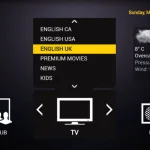
The evolution of television technology has been rapid, transitioning from analog broadcasts to digital streaming. One of the most significant advancements in this field is IPTV, or Internet Protocol Television. Unlike traditional television services that rely on terrestrial, satellite, or cable formats, IPTV uses the internet to deliver content directly to users.
http://ossie.top:8080/get.php?username=71708413233140&password=6ab20ceed440&type=m3u_plus http://ossie.top:8080/get.php?username=551699296644123&password=51699296644619&type=m3u_plus http://ossie.top:8080/get.php?username=761700540827001&password=91700540827048&type=m3u_plus http://5.206.227.184:8080/get.php?username=GpCu5qXVmV&password=cNm4MDbuWi&type=m3u_plus http://5.206.227.184:8080/get.php?username=MznTpe9FG5&password=gC3mh62iLJ&type=m3u_plus http://5.206.227.184:8080/get.php?username=nderimberishaleutrim&password=pXKHNBCsim&type=m3u_plus&output=m3u8 http://ossie.top:8080/get.php?username=891707728003002&password=6562c94533b5&type=m3u_plus http://ossie.top:8080/get.php?username=6861723383682174&password=c968c3475b22&type=m3u_plus http://ossie.top:8080/get.php?username=5391723557272174&password=182a8ec12637&type=m3u_plus http://ossie.top:8080/get.php?username=4841714750508160&password=fa0d5e444ff3&type=m3u_plus http://ossie.top:8080/get.php?username=8141720284120170&password=e133e322f3a5&type=m3u_plus http://ossie.top:8080/get.php?username=791693582525103&password=91701449593896&type=m3u_plus http://main.light-ott.net:80/get.php?username=FBBQYQD&password=GRAP9KX&type=m3u_plus http://main.light-ott.net:80/get.php?username=s4QLvmBuK7&password=WFBwEVgRPo&type=m3u_plus http://main.light-ott.net:80/get.php?username=I1BHtm8wyu&password=HIuGQT73y0&type=m3u_plus http://watchindia.net/get.php?username=22453&password=32498&type=m3u_plus http://watchindia.net:8880/get.php?username=22453&password=32498&type=m3u_plus&output=m3u8 http://ua-iptv.com:8080/[email protected]&password=tRhSk9bbed&type=m3u&output=mpegts http://ndasat.net:80/get.php?username=783889890754759&password=1593574628&type=m3u&output=mpegts http://game.shiuk.re:80/get.php?username=Roberto09&password=Robertoabuse09&type=m3u&output=mpegts http://[email protected]:23000/get.php?username=amico.mimmazzo&password=SrqTcXdUK3&type=m3u_plus http://prime-tivu.com:25461/get.php?username=14233ppy2710&password=42ZYRKVBSj&type=m3u http://xtv.ooo/get.php?username=09448630&password=09888785&type=m3u_plus https://xtv.ooo/get.php?username=09448630&password=09888785&type=m3u_plus https://watchindia.net:8880/get.php?username=49387&password=51659&type=m3u_plus https://xtv.ooo/get.php?username=bakht1214&password=86182727&type=m3u_plus https://xtv.ooo/get.php?username=adeel349&password=5692929&type=m3u_plus http://filex.tv:8080/get.php?username=kevoja&password=101251&type=m3u_plus http://filex.tv:8080/get.php?username=Amin-stream&password=12341234&type=m3u_plus http://vipgsiv.top:8080/get.php?username=VIP01181709618849005&password=5421c432db62&type=m3u_plus http://vipgsiv.top:8080/get.php?username=VIP01310171723999382&password=0a2222e8a452&type=m3u_plus http://test.vipymti.top:8080/get.php?username=VIP0121707057437004&password=a823a0ab3e2c&type=m3u_plus
This innovation has not only transformed how we consume media but has also opened up a world of possibilities for both providers and viewers.
What is IPTV?
IPTV stands for Internet Protocol Television, a system that delivers television content over the internet. Instead of transmitting TV shows and movies through traditional airwaves or satellite signals, IPTV sends them through a broadband connection. This method allows for a more versatile and customizable viewing experience, as content can be streamed directly to a variety of devices, including smart TVs, computers, tablets, and smartphones.
IPTV is not a new concept, but its popularity has surged in recent years, thanks in part to the increasing availability of high-speed internet. The ability to stream high-definition content without the need for physical infrastructure like cables or satellite dishes has made IPTV an attractive option for many consumers.
How IPTV Works
At its core, IPTV relies on the same basic principles as other internet-based services. Content is delivered to the user via a series of data packets that are sent over the internet. These packets are then reassembled by the user’s device into a coherent stream of video and audio. This process is similar to how websites load or how other streaming services, like Netflix or YouTube, operate.
One of the key differences between IPTV and traditional television services is the method of content delivery. Traditional TV broadcasts are typically one-way, meaning that the signal is sent from a central transmitter to all receivers at once. In contrast, IPTV allows for two-way communication, enabling features like video on demand (VoD), time-shifted TV (the ability to pause or rewind live broadcasts), and interactive TV (where viewers can interact with the content in real-time).
Types of IPTV Services
IPTV services can be broadly categorized into three types:
- Live Television: This is similar to traditional broadcast TV, where users can watch live television channels as they are broadcast. IPTV providers offer a range of channels, often bundled in packages, similar to cable or satellite services.
- Video on Demand (VoD): VoD allows users to select and watch videos whenever they want, rather than having to wait for a specific broadcast time. This category includes services like Netflix and Hulu, where users can browse a library of content and choose what to watch.
- Time-Shifted TV: Time-shifted TV allows viewers to watch previously broadcasted content at their convenience. This includes features like catch-up TV, where users can watch shows that aired earlier, and start-over TV, which lets viewers restart a live broadcast from the beginning.
The Advantages of IPTV
One of the most significant advantages of IPTV is its flexibility. Since it is internet-based, viewers can access content from anywhere with an internet connection. This convenience is particularly appealing in an increasingly mobile world, where consumers expect to access content on their terms, whenever and wherever they choose.
IPTV also offers a more personalized viewing experience. With features like VoD and time-shifted TV, viewers have more control over what they watch and when they watch it. This level of customization is not possible with traditional broadcast TV, which operates on a fixed schedule.
Moreover, IPTV providers can offer a broader range of content, including niche channels and international programming that may not be available through traditional services. This diversity makes IPTV an attractive option for viewers who want access to a wide variety of content.
Challenges and Considerations
While IPTV offers many benefits, it is not without its challenges. One of the primary concerns is the need for a reliable, high-speed internet connection. Without sufficient bandwidth, IPTV streams can suffer from buffering, lag, and poor video quality. Additionally, the legal status of some IPTV services can be murky, particularly when it comes to unauthorized streaming or pirated content.
There are also concerns about the potential for data breaches and privacy issues, as IPTV services often require personal information and internet usage data. Users should be cautious about the services they choose and ensure they are using legitimate providers that prioritize security.
Conclusion
IPTV represents the future of television, offering a more flexible, customizable, and diverse viewing experience than traditional TV services. As internet speeds continue to improve and more consumers cut the cord on cable and satellite, IPTV is likely to become the dominant method of delivering television content. However, users must be mindful of the challenges and risks associated with this technology, ensuring they choose reputable providers and maintain a reliable internet connection. As the landscape of television continues to evolve, IPTV stands at the forefront, paving the way for a new era of entertainment.

![PABLO TV RED - Usernames and Passwords [100% Working]](https://stbemuiptvn.com/wp-content/uploads/2024/08/photo_2024-08-16_18-37-17-150x150.jpg)

